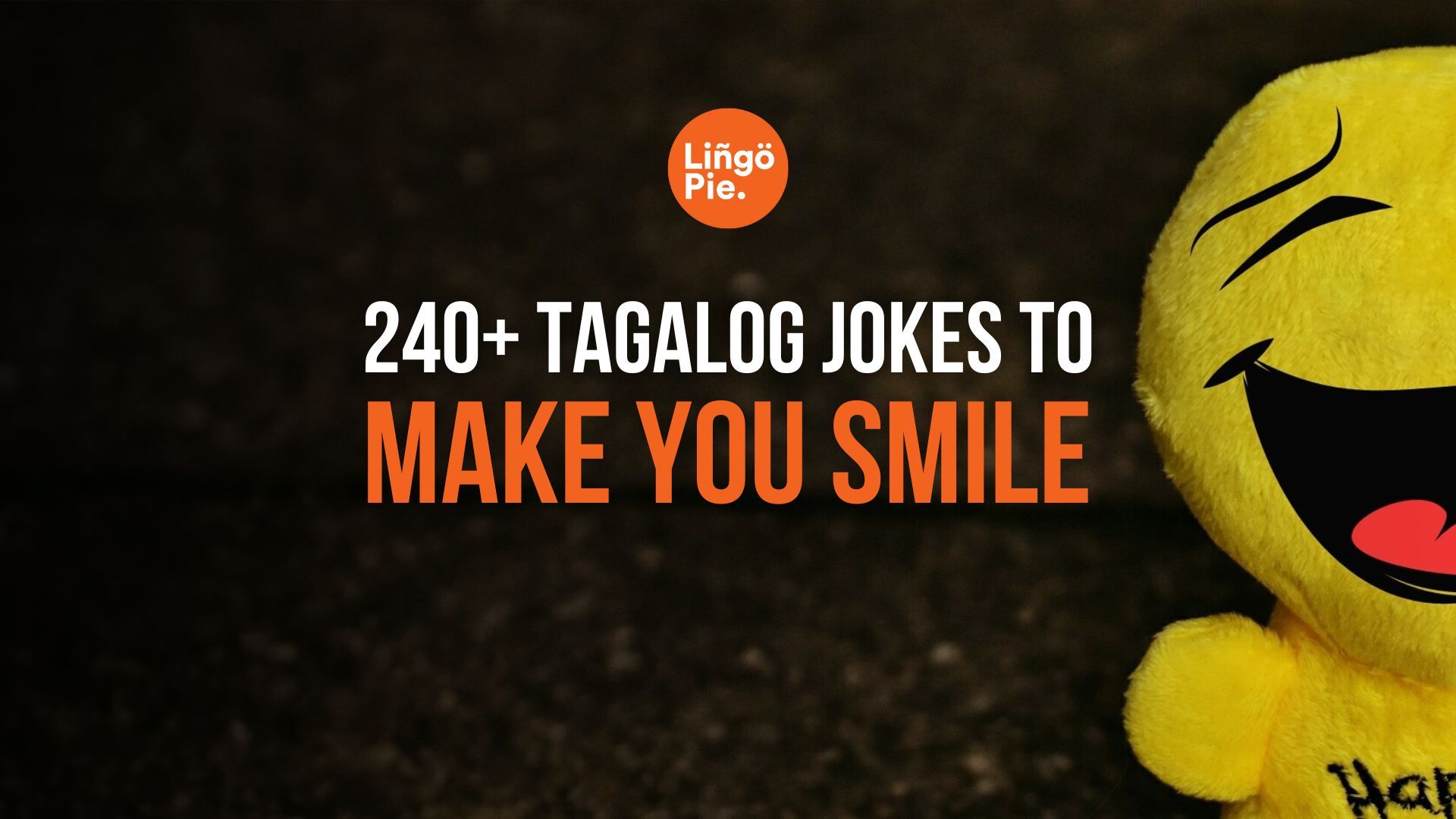One of the best parts about being bilingual? You get to laugh in more than one language! As someone who genuinely loves learning foreign languages, I know for one that knowing jokes in different languages lets you enjoy humor that might not make sense in translation.
Take this one for example: "¿Qué le dice un techo a otro? Techo de menos." If you're scratching your head at that pun, you’re missing out on a good laugh! But don’t worry, I've got you covered.
Learning Spanish through jokes is not just fun—it’s a sneaky shortcut to improve your language skills while connecting with native speakers. With funny Spanish jokes, you can easily pick up wordplay, idioms, and cultural nuances faster! And the best part? It's not just anecdotal – research backs this up too.
In fact, it was discovered that humor in language classes reduces tension, increases retention, and increases enjoyment. In other words, laughter isn't just the best medicine – it's also a fantastic language teacher!
So in this post, I've teamed up with Lingopie's polyglot crew to bring you this collection of 100+ jokes in Spanish that'll have you laughing and learning in equal measure.

How Do You Say Joke In Spanish?
In Spanish, the word for "joke" is chiste (chees-teh). Another common word you might hear is broma (broh-ma), which can also mean a prank or playful teasing. While chiste is used for most funny remarks or punchlines, broma is often used for jokes that involve some trickery. Let’s see these words in action:
- "Es solo un chiste, ¡no te preocupes!" (It’s just a joke, don’t worry!)
- "Me contó un chiste buenísimo." (He told me a really good joke.)
- "¡Qué buena broma, casi me la creo!" (What a good prank, I almost believed it!)
Want to make Spanish people crack? The good news here is that Spanish has a variety of terms related to jokes, ranging from casual jokes to witty remarks and playful pranks. Let’s explore some of these keywords and their meanings.
| Word | Translation | Meaning/Usage |
|---|---|---|
| Chiste | Joke | A humorous remark or punchline |
| Broma | Prank | A playful prank or teasing |
| Bromista | Joker/Prankster | A person who loves making jokes or pranks |
| Gracioso | Funny | Something or someone that causes laughter |
| Chistoso | Funny (informal) | Often used to describe a witty or funny person |
| Burla | Mockery | A sarcastic or mocking joke |
| Chascarrillo | Quip | A witty or humorous remark |
| Sarcasmo | Sarcasm | Humor involving irony or mocking tone |

Joking Culture in Spanish-Speaking Countries
Thanks to influences from the Romans, Moors, and indigenous Latin American cultures, Spanish humor has developed into something uniquely vibrant. Take Don Quijote de la Mancha, for example—Cervantes used irony and absurdity to poke fun at society way back in the 1600s, and that same spirit is still alive in modern Spanish humor.
To help you understand the concept of joking in Spanish-speaking countries, here are some things you need to know:
- Spanish humor thrives on wordplay. A popular example is the pun (juegos de palabras) on “Kansas” and cansas (to tire), where phonetic similarities lead to witty misunderstandings.
- Irony and sarcasm are common, but often subtle. Spanish jokes may rely on the delivery or context, making them more layered compared to slapstick humor in other cultures.
- Many jokes reflect local culture, politics, or history. Humor can serve as social commentary, addressing societal issues or current events in a playful way.
How Do You Laugh in Spanish Through Text?
In Spanish-speaking cultures, laughter is expressed in text similarly to English, but with some fun variations:
- "Jajaja" is the Spanish equivalent of "hahaha." The "j" in Spanish sounds like the "h" in English, making it a natural choice.
- "Jejeje" or "Ji ji ji" are variations, with each representing different tones of laughter, from mischievous to giggly.
- You might also see "LOL" used occasionally, but local expressions like "XD" (laughing face emoji) are more popular.
This reflects the playful and flexible nature of Spanish texting culture!
30 Funny Spanish Jokes In Spanish
Here’s a fun collection of one-liner jokes in Spanish that will make you laugh while also helping you learn the Spanish language. These funny Spanish jokes are short, snappy, and showcase the clever wordplay native Spanish speakers love.
- "Obvio, microbio."
Translation: Obviously, microbe.
(This is a fun, dismissive way to respond when someone states the obvious, similar to saying “Thank you, Captain Obvious!” in English) - "Me canso, ganso."
Translation: I’m tired, goose.
(This is used humorously when you're feeling tired, calling someone "ganso" for fun) - "¿Qué te pasa, calabaza?"
Translation: What’s up, pumpkin?
(This rhyme is playful and often followed by “Nada, nada, limonada,” meaning “Nothing, nothing, lemonade.” It’s a fun and rhythmic way to ask how someone is doing) - "¿Cómo llamas a un zapato en inglés? ¡A shoe!"
Translation: How do you call a shoe in English? A shoe!
(This joke plays with the Spanish word “achú” (achoo, the sound of a sneeze), making it sound like “a shoe”) - "¿Cómo se queda un mago después de comer? Magordito."
Translation: What happens to a magician after eating? He gets a little chubby.
(A wordplay with “mago” (magician) and “gordito” (chubby), creating a fun pun) - "Chao, chao, bacalao."
Translation: Bye bye, codfish.
(A playful way to say goodbye, rhyming “chao” with “bacalao”). - "Eso, eso, pan con queso."
Translation: That’s right, bread with cheese.
(This rhyme is used humorously when you agree with someone. The playful rhyme adds a bit of fun to any conversation) - "¿Qué le dijo una piedra a otra? ¡La vida es dura!"
Translation: What did one rock say to another? Life is hard!
(This pun plays on the word “dura,” which means both “hard” and “difficult”) - "¿Cuál es la fruta más divertida? La naranja, ja ja ja."
Translation: What’s the funniest fruit? The orange, ha ha ha.
(This joke uses the sound “ja” (ha) to make a pun with “naranja” (orange) - "¿Por qué el café fue a la escuela? Porque quería ser más fuerte."
Translation: Why did the coffee go to school? Because it wanted to be stronger.
(A pun using the word “fuerte,” which means both “strong” as in flavor and “strong” as in strength) - "¿Qué hace una abeja en el gimnasio? ¡Zum-ba!"
Translation: What does a bee do in the gym? Zumba!
(This joke plays on the word “zumba,” the exercise, and “zumbido,” which is the buzzing sound bees make) - "¿Cuál es el colmo de Aladdín? Tener mal genio."
Translation: What’s the worst thing for Aladdin? Having a bad temper (genie).
(A play on the word “genio,” meaning both “genie” and “temper” in Spanish) - "¿Cuál es el animal más antiguo? La cebra, porque está en blanco y negro."
Translation: What’s the oldest animal? The zebra, because it’s in black and white.
(A joke that plays on the classic black-and-white TV sets and the zebra’s color) - "¿Por qué los pájaros no usan Facebook? Porque ya tienen Twitter."
Translation: Why don’t birds use Facebook? Because they already have Twitter.
(A modern tech joke about social media and birds tweeting) - "¿Qué le dijo el semáforo al coche? No me mires, me estoy cambiando."
Translation: What did the traffic light say to the car? Don’t look at me, I’m changing.
(This joke is about the traffic light changing colors) - "¿Cómo se llama un boomerang que no vuelve? Un palo."
Translation: What do you call a boomerang that doesn’t come back? A stick.
(A simple joke about a failed boomerang that’s just a regular stick) - "¿Qué le dice una iguana a su hermana gemela? Somos iguanitas."
Translation: What does one iguana say to her twin sister? We’re little iguanas.
(A cute rhyme using “iguanitas” to express “iguanas” and "hermanitas") - "¿Cómo se dice pañuelo en inglés? Tissue."
Translation: How do you say “pañuelo” in English? Tissue.
(A word joke playing on the similarity between “achú” (sneeze sound) and “a tissue”) - "¿Qué hace una computadora cuando tiene hambre? Se toma un byte."
Translation: What does a computer do when it’s hungry? It takes a byte.
(A tech joke about the word “byte” in computer terms) - "¿Cómo se despiden los químicos? Ácido un placer."
Translation: How do chemists say goodbye? Acid to meet you.
(This joke is a pun on the word “ácido” (acid) and “ha sido” (it’s been) - "¿Qué le dice una impresora a otra? Esa hoja es tuya o es una impresión mía."
Translation: What does one printer say to the other? Is that paper yours or is it just my impression?
(A pun on “impresión,” which means both “impression” and “print”) - "¿Por qué las focas miran siempre hacia arriba? Porque ahí están los focos."
Translation: Why do seals always look up? Because that’s where the lights are.
(Wordplay on “foca” (seal) and “foco” (lightbulb)) - "¿Cómo se llama el pez más divertido? El pez-payasito."
Translation: What’s the funniest fish called? The clownfish.
(A joke about the clownfish, playing on “payasito” (little clown)) - "¿Cuál es el café más peligroso del mundo? El ex-preso."
Translation: What’s the most dangerous coffee in the world? The ex-press.
(A pun on “expreso” (espresso) and “ex-preso” (ex-convict)) - "¿Cómo se despiden los atómicos? Fisión para siempre."
Translation: How do atoms say goodbye? Fission forever.
(A chemistry joke playing on “fisión” (fission) and “hasta siempre” (forever)) - "¿Cuál es el animal más feliz? El lombriz... porque va lom-briz."
Translation: What’s the happiest animal? The worm... because it’s always worm-laughing.
(A pun with “lombriz” (worm) and “riéndose” (laughing)) - "¿Por qué los esqueletos no pelean entre ellos? Porque no tienen agallas."
Translation: Why don’t skeletons fight with each other? Because they don’t have guts.
(A joke on “agallas,” which means both “guts” and “courage”) - "¿Qué le dice una oreja a otra? Con tanta cera, no te oigo."
Translation: What does one ear say to the other? With all this wax, I can’t hear you.
(A playful take on earwax and hearing) - "¿Por qué el libro de historia se siente tan deprimido? Porque tiene demasiados capítulos tristes."
Translation: Why does the history book feel so depressed? Because it has too many sad chapters.
(A pun about the chapters in history books often being tragic) - "¿Qué le dice una iguana a su hermana? ¡Somos igualitas!"
Translation: What does one iguana say to her sister? We’re identical!
(A pun on the word “igualitas,” meaning “identical,” and “iguana”)


20 Silly Spanish Jokes In Spanish
Silly Spanish jokes are your secret decoder ring for Spanish TV and movies. These puns and wordplays often baffle non-native speakers, but understanding them unlocks a new level of language mastery.
- "¿Qué hace un pez perezoso? ¡Nada!"
Translation: What does the lazy fish do? Nothing (or He swims).
(Wordplay on “nada,” which means both "nothing" and "swims") - "¿Cuál es la fruta más paciente? ¡Espera!"
Translation: What’s the most patient fruit? The pear.
(A pun on “espera” meaning "wait" and "pera," meaning "pear") - "¿Cómo se queda un mago después de comer? Magordito."
Translation: What happens to a magician after eating? He becomes chubby.
*(Playing on “más gordito” (a little chubbier) and “mago” (magician)) - "¿Qué le dijo el número 1 al número 10? Para ser como yo, tienes que ser sincero."
Translation: What did number 1 say to number 10? To be like me, you have to be “without zero” (sin cero).
(A pun on “sincero,” which means sincere but also sounds like "without zero") - "¿Qué hace una abeja en el gimnasio? ¡Zumba!"
Translation: What does a bee do at the gym? Zumba!
(This joke plays with the word “zumba” meaning both a workout and the buzzing sound of a bee) - "¿Cómo se llama un hotel muy malo? ¡Una posadilla!"
Translation: What do you call a really bad hotel? A "nightmare-inn."
(Combining “posada” (inn) with “pesadilla” (nightmare)) - "¿Qué le dice un techo a otro? ¡Techo de menos!"
Translation: What does one roof say to the other? I miss you!
(Playing with “te echo de menos,” which sounds like "techo," meaning roof) - "¿Cuál es el colmo de Aladdín? Tener mal genio."
Translation: What’s the worst thing for Aladdin? To have a bad temper (genio means both genie and temper) - "¿Cómo haces para que un pan hable? Lo pones en agua toda la noche y al día siguiente ya está blando."
Translation: How do you make bread talk? Leave it in water all night, and the next day it will be soft (or "talking").
(A pun between “blando” (soft) and “hablando” (talking)) - "¿Cómo se llama el pez más negativo? ¡Pesimista!"
Translation: What do you call the most negative fish? A pessimist!
(This joke works on the similarity between “pez” (fish) and “pesimista” (pessimist) - ¿Qué hace una abeja en el gimnasio? ¡Zumba!
Translation: What does a bee do in the gym? Zumba!
(This pun plays on the verb “zumbar,” which means to buzz, and the popular fitness class Zumba) - ¿Cómo haces para que un pan hable? Lo pones en agua toda la noche y al día siguiente ya está blando.
Translation: How do you make bread talk? You leave it in water overnight, and by the morning, it's soft (or "talking").
(A pun on “blando” (soft) and “hablando” (talking)) - ¿Cuál es la fruta más divertida? ¡La naranja ja ja ja ja!
Translation: What’s the funniest fruit? The orange ha ha ha ha!
(A joke that plays on “ja,” which sounds like the laugh “ha”) - ¿Por qué el astronauta no pudo reservar una pensión en la luna? Porque estaba llena.
Translation: Why couldn’t the astronaut book a room on the moon? Because it was full.
(Playing on "llena," meaning full both literally and figuratively) - ¿Cómo se llama un pez negativo? ¡Pesimista!
Translation: What do you call a negative fish? A pessimist!
(A play on “pez” (fish) and “pesimista” (pessimist)) - ¿Qué le dice una taza a otra taza? ¿Qué tazaciendo?
Translation: What does one cup say to another cup? What are you doing?
(Playing on the word “taza” (cup) and “haciendo” (doing)) - ¿Qué se lava en playas muy pequeñas? ¡Microondas!
Translation: What do you wash at tiny beaches? Microwaves!
(A pun using “ondas,” which means waves, but also refers to microwaves in Spanish) - ¿Cuál es el vino más amargo? Vino mi suegra.
Translation: What’s the bitterest wine? My mother-in-law came.
(Playing with the word “vino” as both wine and the verb "came") - ¿Cómo se despiden dos químicos? ¡Ácido un placer!
Translation: How do two chemists say goodbye? It’s been a pleasure (acid)!
(Playing on “ácido” (acid) and “ha sido” (it’s been)) - ¿Qué hace un perro mago? ¡Ladracadabra!
Translation: What does a magician dog do? Bark-adabra!
(A pun combining “ladrar” (to bark) and the magic phrase "abracadabra")


30 Simple Spanish Jokes For Kids
Here’s a fun and simple collection of Spanish jokes for kids that are perfect for those just learning the basics of the language. These jokes are light, easy to understand, and sure to make children smile while helping them practice their new Spanish words.
- ¿Qué le dijo el número cero al número ocho?
Me gusta tu cinturón.
Translation: What did the number zero say to the number eight? I like your belt.
(This joke plays on how the number eight looks like a zero wearing a belt.) - ¿Cuál es la fruta más cómica?
Naranja ja ja ja.
Translation: What’s the funniest fruit? The orange ha ha ha.
(The word “naranja” (orange) ends with “ja,” making it sound like laughter.) - ¿Qué le dijo una pulga a otra? Vamos a pie o esperamos al perro.
Translation: What did one flea say to the other? Are we going on foot or waiting for the dog?
(A cute joke about fleas "riding" on dogs) - ¿Cuál animal puede saltar más alto que una casa?
Cualquiera, porque las casas no saltan.
Translation: Which animal can jump higher than a house? Any animal, because houses don’t jump.
(A playful joke with an obvious answer.) - ¿Qué hace un pez?
¡Nada!
Translation: What does a fish do? It swims (or nothing).
(A pun on “nada,” which means both “nothing” and “swim” in Spanish.) - ¿Qué le dijo el ojo izquierdo al ojo derecho? Entre nosotros, algo huele mal.
Translation: What did the left eye say to the right eye? Between us, something smells bad.
(A joke about the nose being between the two eyes.) - ¿Cómo se llama un Boomerang que no vuelve? Un palo.
Translation: What do you call a boomerang that won’t come back? A stick.
(A straightforward, silly joke about an inactive boomerang.) - ¿Por qué fue el ordenador al médico? Porque tenía un virus.
Translation: Why did the computer go to the doctor? Because it had a virus.
(A play on technology and viruses.) - ¿Por qué el cuaderno de matemáticas está triste?
Porque tiene muchos problemas.
Translation: Why is the math notebook sad? Because it has too many problems.
(“Problemas” means both math problems and difficulties.) - ¿Qué tipo de agua no se puede congelar?
Agua caliente.
Translation: What type of water can’t freeze? Hot water.
(A joke playing on the obvious answer.) - ¿Qué le dice un cero a otro cero?
No somos nada.
Translation: What does one zero say to another? We are nothing.
(This joke plays on the fact that zero means nothing.) - ¿Qué se pone Superhombre cuando huele mal?
Superfume.
Translation: What does Superman wear when he smells bad? Superfume (super cologne).
(A fun play on the word “perfume” with a superhero twist.) - ¿Qué es marrón, peludo y lleva gafas de sol? Un coco de vacaciones.
Translation: What’s brown, hairy, and wears sunglasses? A coconut on vacation.
(A funny image of a coconut "enjoying" a holiday.) - ¿Qué le dijo el semáforo a los coches? No mires que me estoy cambiando.
Translation: What did the traffic light say to the cars? Don’t look, I’m changing!
(A joke about the traffic light "changing clothes.") - ¿Qué dijo el gato después de chocar su carro?
¡Miauto!
Translation: What did the cat say after crashing its car? Meow-to (My car).
(A wordplay on "miau" (meow) and “auto” (car). - ¿Por qué los perros no son buenos bailarines? Porque tienen dos pies izquierdos.
Translation: Why aren’t dogs good dancers? Because they have two left feet.
(A pun on the phrase "two left feet" meaning bad at dancing.) - ¿Cuál es el día favorito del gato?
Miaucoles.
Translation: What’s the cat’s favorite day? Meow-nesday (Wednesday).
(Combining “miau” (meow) with “Miércoles” (Wednesday). - ¿Qué le dijo el plátano al perro? Nada, los plátanos no hablan.
Translation: What did the banana say to the dog? Nothing, bananas don’t talk.
(A silly joke because bananas can’t talk.) - ¿Qué hace el fantasma artístico?
Dibuuuuujos.
Translation: What does the artistic ghost do? Drawings (Boo-ings).
(A wordplay combining “dibujo” (drawing) and “boo” from a ghost.) - ¿Qué corre pero no puede caminar?
¡El agua!
Translation: What runs but can’t walk? Water.
(Referring to how water "runs" in rivers but doesn’t walk.) - ¿Cuál es la fruta más paciente?
Es pera.
Translation: What’s the most patient fruit? A pear.
(Playing on “espera” (wait) and “pera” (pear). - ¿Qué es peor que encontrar una lombriz en una manzana? Encontrar media lombriz.
Translation: What’s worse than finding a worm in your apple? Finding half a worm.
(A joke playing on the unpleasant thought of eating half of a worm.) - ¿Qué le dice el mar a la playa?
¡Ola!
Translation: What does the sea say to the beach? Wave!
(A play on the word “ola” which means wave, like a greeting.) - ¿Cuáles son las vacas más perezosas?
¡Vacaciones!
Translation: What are the laziest cows? Vacations.
(Playing on the word “vaca” (cow) and “vacaciones” (vacations).) - ¿Qué es lo que más se moja cuando más se seca?
Una toalla.
Translation: What gets wetter the more it dries? A towel.
(This joke plays with the purpose of a towel to dry things.) - ¿Qué le dijo el 8 al 12?
¡Vente conmigo!
Translation: What did the 8 say to the 12? Come with me!
(A wordplay on “veinte” (twenty), formed by 8 + 12.) - ¿Cómo se llama el perro mago? El abracalabrador.
Translation: What do you call a magician dog? Abracadabrador.
(A playful combination of “abracadabra” and the dog breed "labrador.") - ¿Cuál es mayor, la luna o el sol?
La luna, porque la dejan salir de noche.
Translation: Which is bigger, the moon or the sun? The moon, because they let it out at night.
(A joke playing on the idea of "letting the moon out.") - ¿Qué animal es dos veces animal?
El gato, porque es gato y araña.
Translation: Which animal is two times an animal? The cat, because it’s a cat and it scratches (spider).
(A play on “araña” which means both "spider" and "to scratch.") - ¿Qué fue el último animal que Dios puso en la Tierra?
El delfín.
Translation: What was the last animal God put on Earth? The dolphin.
(A pun with “del fin,” which means "from the end.")


21 Bilingual Funny Jokes in Spanish
Here’s a fun selection of bilingual jokes in Spanish that mix both Spanish and English (Spanglish), perfect for learners or anyone who enjoys wordplay in multiple languages. These jokes often rely on clever puns, cultural references, or similar-sounding words, making them enjoyable for people who understand both languages.
- ¿Cómo se siente un oso enfadado?
FuriOSO.
(A pun on the Spanish word “furioso” (angry) and the word "oso" (bear). - A: How do you call a crocodile in a vest?
B: Un investigador (an investigator).
(A clever play on the Spanish word “investigador” and "gator.") - What do you call a Spanish cat who loves to dance?
The Meow-riachi!
(A pun on the word "mariachi" and "meow" for a cat.) - What does a nosey pepper do?
Gets JALAPEÑO your business.
(A playful pun on the word "jalapeño" sounding like "all up in your" business.) - What’s the best place for mid-week, one-stop shopping?
Wal-MARTES!
(Combining “Martes” (Tuesday) in Spanish with the name "Walmart.") - A: ¿Cómo se dice “zapato” en inglés?
B: A shoe.
A: ¡Salud!
(A play on the English word “a shoe” sounding like "achoo," mimicking the sound of a sneeze.) - I wrote a song about a tortilla... actually, it's more of a wrap.
(A bilingual joke, playing on the double meaning of “wrap” as both a type of food and a song style.) - A: ¿Cómo se dice nariz en inglés?
B: No sé.
A: ¿Tú tampoco? ¡Nadie lo sabe!
(This joke plays with the Spanish phrase "no sé" (I don’t know) sounding like “nose” in English.) - A Spanish speaker who knows no English walks into a store wanting socks. After a while, they see a pair and exclaim, ¡Eso sí que es!
(“Eso sí que es” sounds like “S-O-C-K-S,” spelling "socks" in English.) - Why did the jalapeño turn red?
Because it saw the salsa!
(A spicy take on "salsa," which means both "sauce" and a Latin dance style.) - Why don’t eggs tell jokes in Spanish?
Because they crack up too easily!
(A pun on "crack up" as both laughter and breaking.) - Why don’t skeletons speak Spanish?
They don’t have the guts!
(Playing on "guts" as courage and literal internal organs.) - What did the taco say to the burrito?
Let’s taco ‘bout it!
(Playing on the word "taco" and the phrase “talk about it.”) - An Englishman on holiday sees a large blue fly and says, “¡Mira el mosa!” The guide corrects him: “No, señor, ‘mosca’ es femenina.” The Englishman responds, “Good heavens, you must have incredible eyesight.”
(This joke plays with the gender of words in Spanish, with "mosca" meaning fly.) - Why can’t you see elephants hiding in trees?
Because they’re so good at it!
(A classic joke, but works in both English and Spanish due to its simplicity.) - Why do cows speak Spanglish?
Because they’re vaca-tions!
(A pun blending "vaca" (cow) and "vacations.") - What do you call a tortilla in a suit?
A wrap star!
(Playing on "wrap" as both food and a celebrity star.) - Why was the computer so tired?
It had a byte of Spanish homework to do!
(Playing on “byte” in computers and "bit" for food.) - A: How do you say "cool" in Spanish?
B: ¡Padre!
A: So, “dad” is cool now?
(Playing on the fact that "padre" means both "father" and "cool" in some contexts.) - A: ¿Cómo se dice "break" en español?
B: Descanso.
A: I really need a break-sanso!
(Mixing the Spanish word "descanso" (break) with the English word "break.") - A: ¿Cómo se dice "bye" en español?
B: Adiós.
A: Ok, adiós-ta la vista!
(Playing on the English phrase "Hasta la vista" combined with "adiós.")
Spanish Jokes In Media
While textbooks provide a foundation, Spanish TV shows and movies offer a richer language experience. Here's why engaging with Spanish media can enhance your language skills:
- Contextual learning: Observe jokes in their natural setting, complete with cultural nuances and non-verbal cues.
- Current language use: Access up-to-date slang, pop culture references, and colloquialisms that textbooks often miss.
When you encounter humor in Spanish media, you're doing more than just watching:
- You're absorbing authentic language patterns
- Your attention is heightened, potentially improving retention
- You're gaining insights into cultural perspectives
Research suggests that engaging content can improve learning outcomes. When you're interested in what you're watching, you're more likely to remember the language used.
If you're looking to enhance your Spanish skills through media, there are various resources available. One option worth considering is Lingopie...
Learn Spanish With Lingopie
Lingopie brings the world of Spanish entertainment right to your screen, offering a vast library of TV shows, movies, and series from across the Spanish-speaking world. But it's more than just a streaming service – it's a language-learning powerhouse. With interactive subtitles, vocabulary lists, and the ability to replay scenes, Lingopie turns every joke, pun, and witty exchange into a learning opportunity.
Why not give it a try? Whether you're a beginner trying to grasp basic phrases or an advanced learner aiming to pick up on subtle humor, Lingopie has content for every level. Try it for FREE now!







![30+ Modern English Slang Terms For Money [Guide]](/blog/content/images/size/w300/2025/06/Slang-term-for-money.jpg)
![5 Official Spanish Language Tests To Show Your Proficiency Level [Guide]](/blog/content/images/size/w300/2025/06/Spanish-Language-Tests.jpg)

![Why Memorizing Spanish Words Won’t Make You Fluent [Tips]](/blog/content/images/size/w300/2025/06/how-to-practice-spanish-vocabulary.jpg)